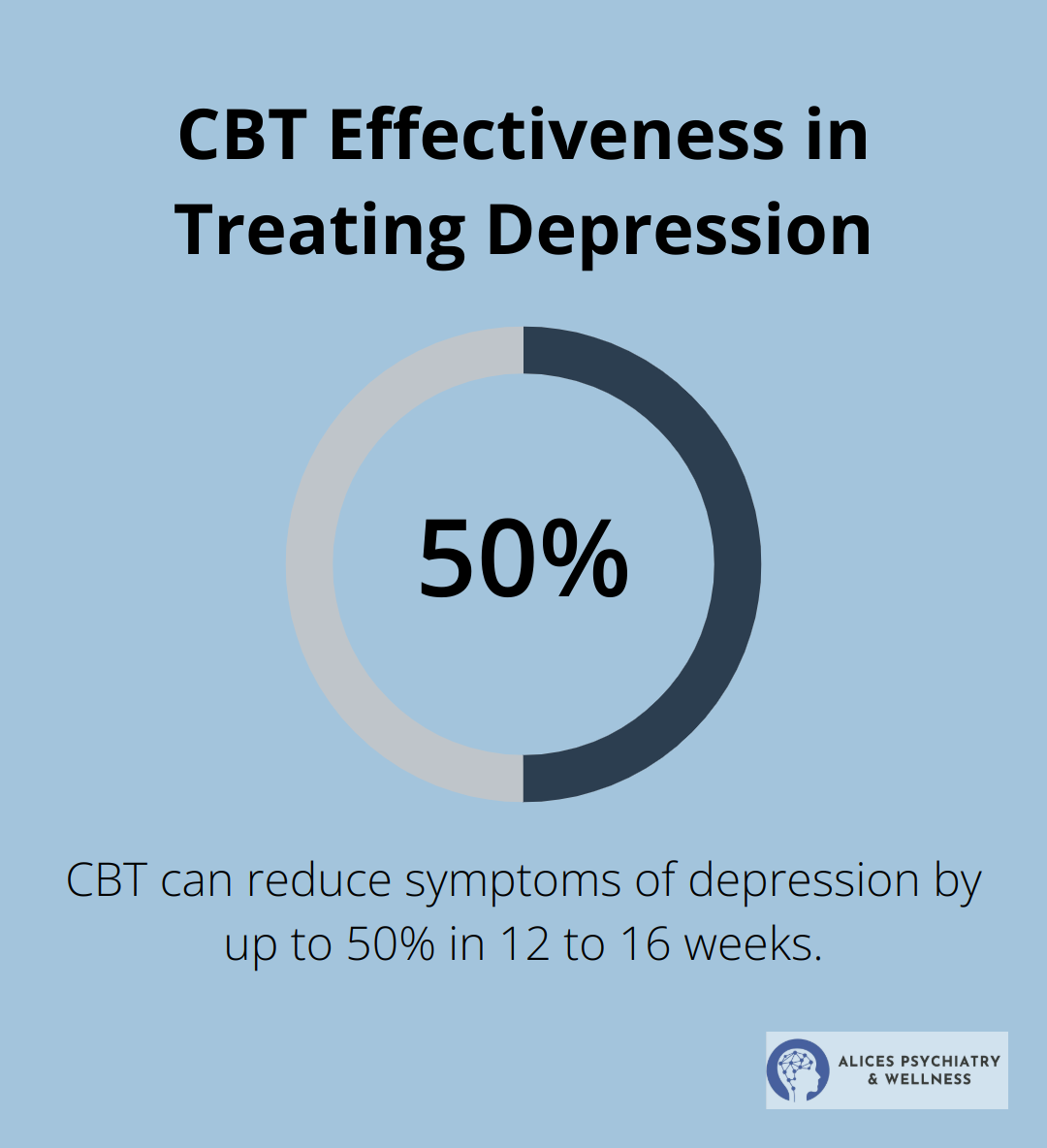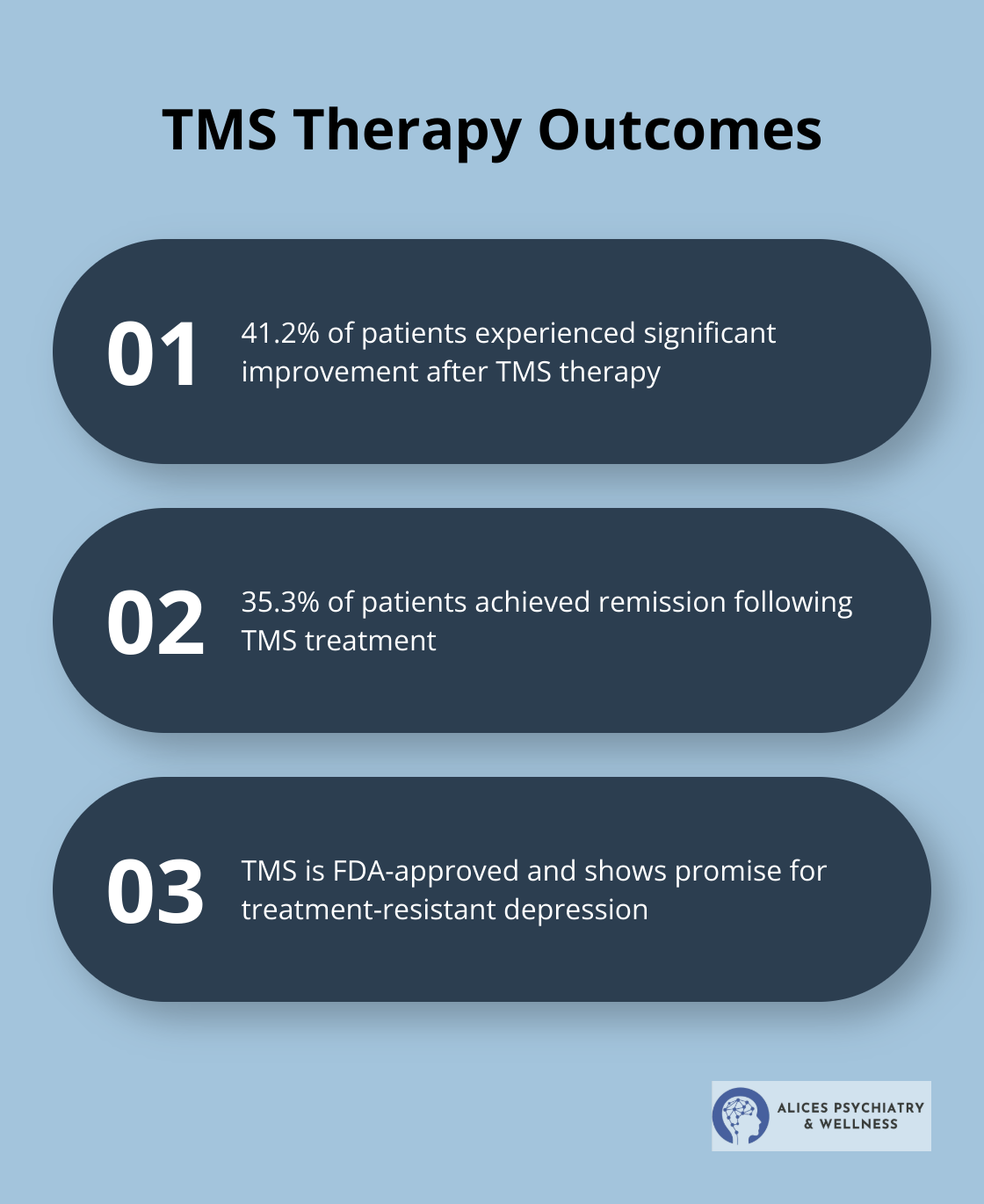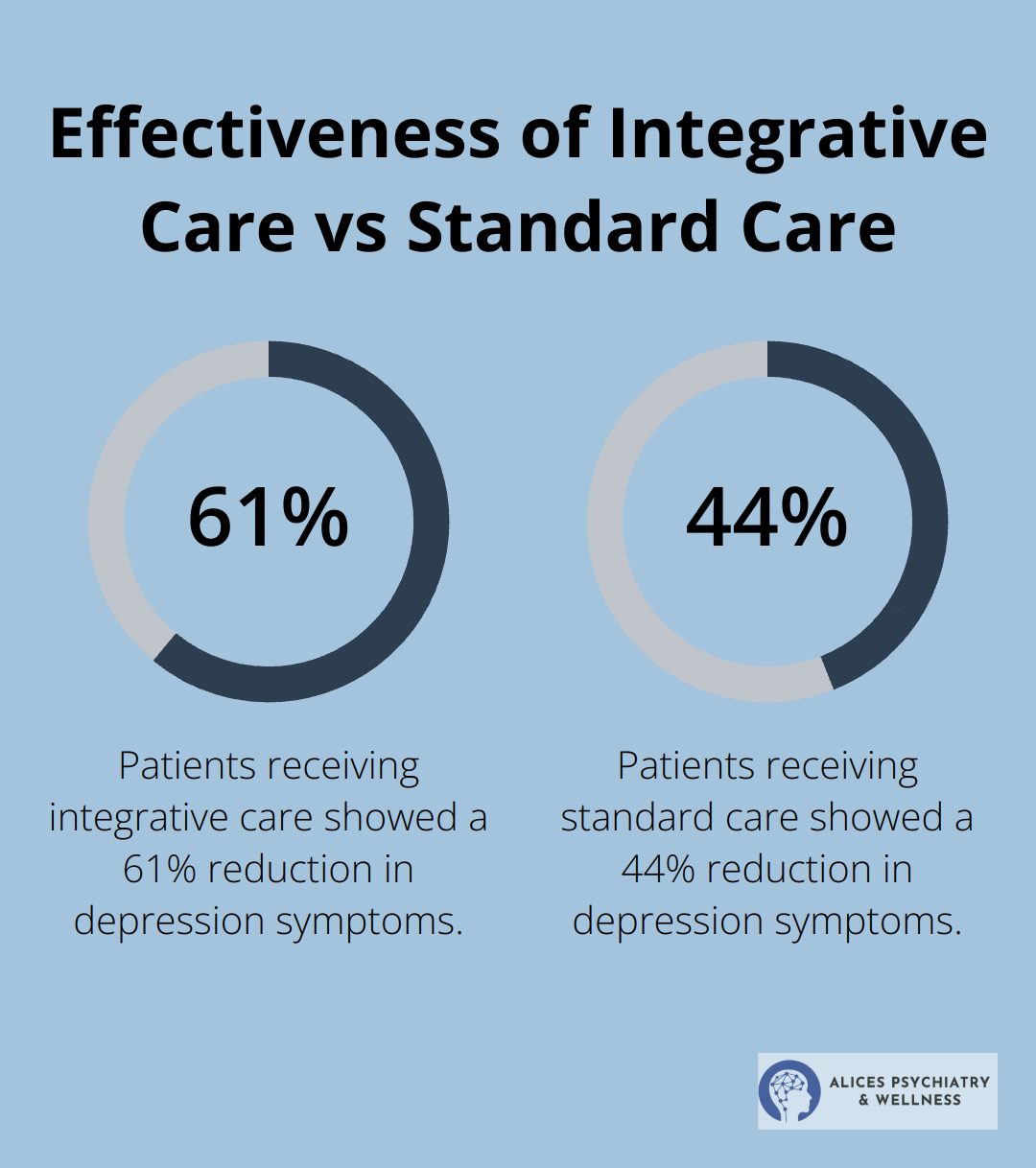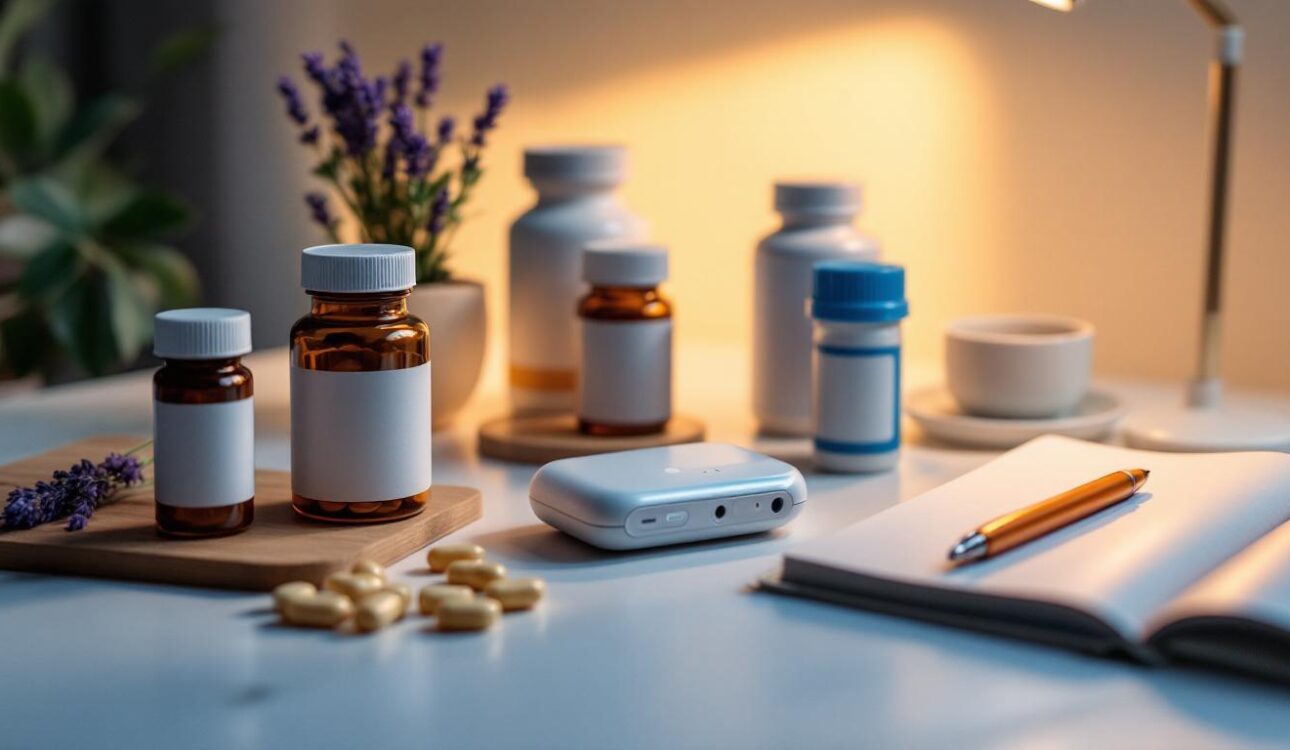At Alice’s Psychiatry and Wellness, we’re excited to explore new treatments for anxiety and depression that are transforming mental health care.
The landscape of mental health treatment is rapidly evolving, offering hope to those who haven’t found relief through traditional methods.
In this post, we’ll examine innovative approaches that are showing promising results, from cutting-edge technologies to personalized treatment plans.
Traditional Treatments for Anxiety and Depression
Anxiety and depression affect millions worldwide. At Alice’s Psychiatry and Wellness, we use a combination of proven traditional treatments to help our patients find relief and improve their quality of life.
Cognitive Behavioral Therapy (CBT)
CBT is a highly effective form of psychotherapy for both anxiety and depression. This approach focuses on identifying and changing negative thought patterns and behaviors. In CBT sessions, patients learn practical skills to manage their symptoms. For example, a person with social anxiety might practice challenging their automatic negative thoughts about social situations. Studies show that CBT can reduce symptoms of depression by up to 50% in 12 to 16 weeks of treatment.

Medication Management
Antidepressants and anti-anxiety medications can be powerful tools in managing symptoms. Selective Serotonin Reuptake Inhibitors (SSRIs) are often the first-line treatment for both conditions. These medications work by increasing serotonin levels in the brain, which can improve mood and reduce anxiety. It’s important to note that finding the right medication and dosage takes time. Pharmacogenetic testing can help determine which medications are likely to be most effective based on a patient’s genetic makeup.
Lifestyle Changes and Self-Care Techniques
While therapy and medication are important, lifestyle changes play a significant role in managing anxiety and depression. Regular exercise has shown to be as effective as medication for mild to moderate depression in some cases. A study published in the American Journal of Psychiatry found that just one hour of exercise a week can prevent 12% of future cases of depression.
Proper sleep hygiene is another critical factor. The National Sleep Foundation recommends adults try to get 7-9 hours of sleep per night. A consistent sleep schedule and a relaxing bedtime routine can significantly improve mood and reduce anxiety symptoms.
Mindfulness meditation is another powerful tool. Researchers found moderate evidence to support the use of mindfulness meditation to treat anxiety, depression, and pain. Even just 10 minutes of daily meditation can make a difference.
Combination Approaches
Often, a combination of these traditional treatments yields the best results. For instance, a patient might engage in weekly CBT sessions, take an SSRI medication, and implement a regular exercise routine (all under professional guidance). This multi-faceted approach addresses the biological, psychological, and lifestyle factors that contribute to anxiety and depression.
The Role of Support Systems
Strong support systems (family, friends, support groups) play a vital role in traditional treatment approaches. These networks provide emotional support, encourage treatment adherence, and help patients practice new coping skills learned in therapy.
While these traditional methods form the foundation of anxiety and depression treatment, the field of mental health is constantly evolving. New, innovative treatments are emerging that offer hope to those who haven’t found relief through conventional approaches. In the next section, we’ll explore some of these cutting-edge therapies that are transforming the landscape of mental health care.
Breakthrough Treatments Reshaping Mental Health Care
At Alice’s Psychiatry and Wellness, we explore innovative treatments for anxiety and depression that transform mental health care. The field evolves rapidly, offering new hope to those who haven’t found relief through traditional methods.
Transcranial Magnetic Stimulation (TMS)
TMS is a non-invasive procedure that uses magnetic fields to stimulate specific brain areas associated with mood regulation. This FDA-approved treatment shows significant promise for patients with treatment-resistant depression. A study found that 41.2% of patients experienced significant improvement after TMS therapy (with 35.3% achieving remission).

TMS sessions typically last about 40 minutes and occur five days a week for four to six weeks. Patients remain awake during the procedure and can resume normal activities immediately afterward. Side effects are generally mild and may include headache or scalp discomfort at the treatment site.
Ketamine Therapy
Ketamine, originally an anesthetic, has emerged as a rapid-acting treatment for severe depression and suicidal ideation. Unlike traditional antidepressants that can take weeks to show effects, ketamine can provide relief within hours or days.
A recent study demonstrates the effectiveness of intravenous ketamine therapy in treating depression. Ketamine infusion shows promising results for patients with treatment-resistant depression.
Ketamine therapy is typically administered intravenously in a controlled medical setting. The treatment consists of a series of infusions over several weeks, with maintenance treatments as needed. It’s important to note that while promising, researchers still study ketamine therapy, and its long-term effects are not yet fully understood.
Virtual Reality Exposure Therapy
Virtual Reality Exposure Therapy (VRET) is an innovative approach particularly effective for anxiety disorders, including phobias and PTSD. This technology allows patients to confront their fears in a controlled, virtual environment under the guidance of a therapist.
A meta-analysis published in the Journal of Anxiety Disorders found that VRET was as effective as traditional exposure therapy for treating specific phobias (with the added benefit of being more accessible and less intimidating for many patients).
VRET sessions typically last 30-60 minutes and occur weekly over 8-12 weeks. The virtual environments are tailored to each patient’s specific fears or triggers, allowing for a highly personalized treatment experience.
These innovative treatments offer new hope for individuals who haven’t found relief through traditional methods. However, every person’s mental health journey is unique. A thorough evaluation determines the most appropriate treatment plan for each individual, which may include these innovative therapies alongside traditional approaches.
As we look to the future of mental health care, personalized treatment approaches are becoming increasingly important. The next section will explore how genetic testing, AI-assisted planning, and integrative medicine are further revolutionizing the field of mental health treatment.
Personalized Treatment Approaches for Anxiety and Depression
Mental health care is not one-size-fits-all. The future of anxiety and depression treatment lies in personalized approaches that consider each individual’s unique genetic makeup, lifestyle, and needs. Let’s explore how cutting-edge technologies and holistic methods revolutionize treatment plans.
Genetic Testing for Precision Medication
Pharmacogenetic testing transforms how we prescribe medications for anxiety and depression. This advanced method analyzes a patient’s genetic profile to predict how they’ll respond to specific drugs. A study in the Journal of Psychiatric Research found that patients whose treatment was guided by genetic testing had a 50% higher chance of remission compared to those receiving standard care.
Pharmacogenetic testing optimizes medication selection. This approach can significantly reduce the trial-and-error process, leading to faster symptom relief and fewer side effects. For instance, a patient with a specific gene variant might metabolize certain antidepressants more slowly, requiring a lower dose to achieve therapeutic effects.
AI-Powered Treatment Planning
Artificial Intelligence makes waves in mental health care by analyzing vast amounts of data to suggest personalized treatment plans. AI-driven models can predict how a patient may respond to different treatment approaches, whether psychotherapy, medication, or lifestyle changes.
These AI systems identify patterns in symptoms, treatment responses, and lifestyle factors that humans might miss. For example, an AI might notice that patients with similar sleep patterns and social media usage tend to respond better to a specific combination of therapy and medication.
While AI doesn’t replace human expertise, it serves as a powerful tool to enhance decision-making. Mental health professionals can use AI-assisted planning to complement their experience and knowledge.
Integrative Approaches for Holistic Healing
Integrative medicine combines conventional treatments with evidence-based complementary therapies to address the whole person – body, mind, and spirit. This approach gains traction in mental health care, with studies showing promising results.
A randomized controlled trial published in the Journal of Clinical Psychiatry found that patients who received integrative care (combining psychotherapy, medication, and mindfulness-based stress reduction) showed a 61% reduction in depression symptoms compared to 44% in the standard care group.

Some effective integrative approaches for anxiety and depression include:
- Nutritional psychiatry: Emerging research links gut health to mental health. A Mediterranean-style diet rich in omega-3 fatty acids, vegetables, and whole grains has been associated with a 33% lower risk of depression.
- Mindfulness-based therapies: Techniques like Mindfulness-Based Cognitive Therapy (MBCT) have shown to be as effective as antidepressants in preventing depression relapse.
- Exercise as medicine: Regular physical activity can be as effective as medication for mild to moderate depression. A study in the American Journal of Psychiatry found that just one hour of exercise a week could prevent 12% of future depression cases.
- Acupuncture: This traditional Chinese medicine technique has shown promise in treating anxiety and depression. A meta-analysis in the Journal of Affective Disorders found that acupuncture was comparable to antidepressants in improving depression symptoms.
The future of mental health care is personalized, integrative, and technology-enhanced. Tailoring treatments to each individual’s unique profile can improve outcomes and help more people find lasting relief from anxiety and depression.
Final Thoughts
The mental health treatment landscape offers new hope for anxiety and depression sufferers. Traditional methods like Cognitive Behavioral Therapy now combine with innovative approaches such as Transcranial Magnetic Stimulation and ketamine therapy. These new treatments for anxiety and depression expand the range of options available to patients.
Personalized care leads modern mental health treatment. Genetic testing, AI-assisted planning, and integrative medicine revolutionize anxiety and depression approaches. These advancements allow for more targeted, effective treatments tailored to each individual’s unique needs and genetic makeup.
If you struggle with anxiety or depression, professional help is available. Don’t hesitate to contact a mental health expert who can guide you through various treatment options. At Alice’s Psychiatry and Wellness, we offer personalized care to support your journey to wellness.





